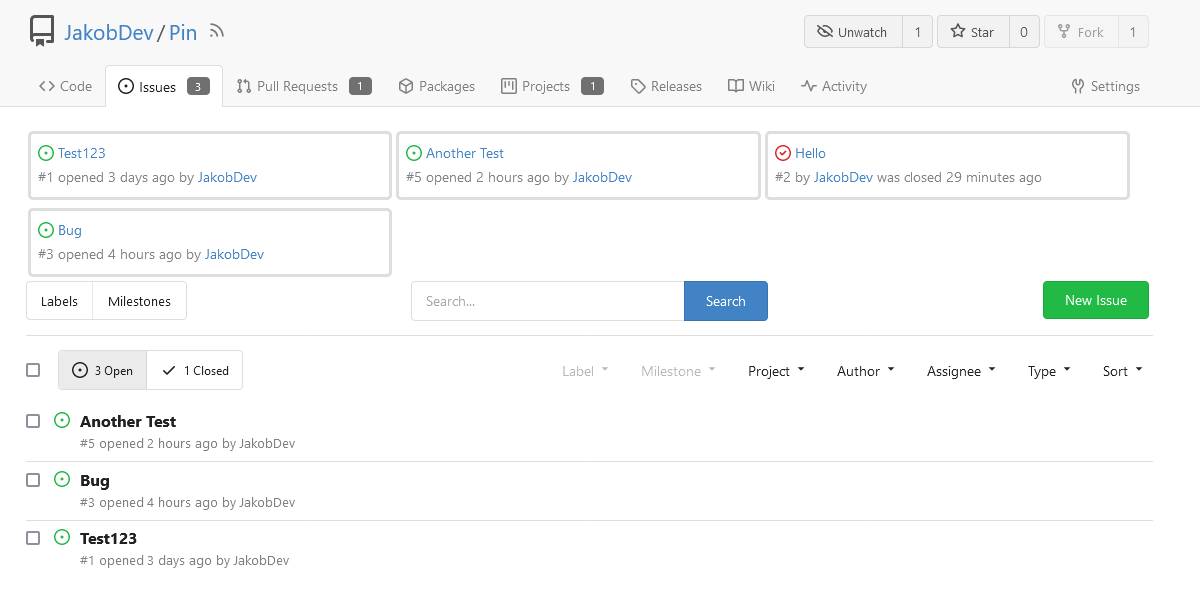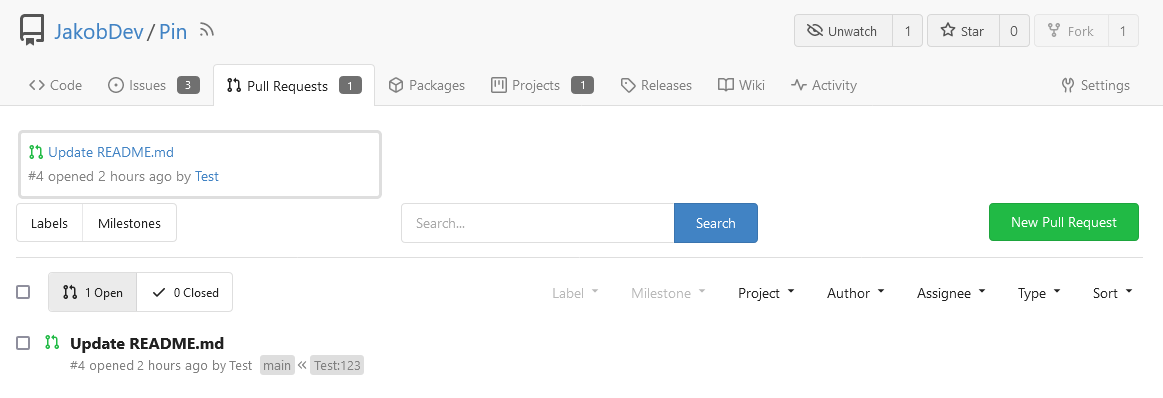This adds the ability to pin important Issues and Pull Requests. You can also move pinned Issues around to change their Position. Resolves #2175. ## Screenshots    The Design was mostly copied from the Projects Board. ## Implementation This uses a new `pin_order` Column in the `issue` table. If the value is set to 0, the Issue is not pinned. If it's set to a bigger value, the value is the Position. 1 means it's the first pinned Issue, 2 means it's the second one etc. This is dived into Issues and Pull requests for each Repo. ## TODO - [x] You can currently pin as many Issues as you want. Maybe we should add a Limit, which is configurable. GitHub uses 3, but I prefer 6, as this is better for bigger Projects, but I'm open for suggestions. - [x] Pin and Unpin events need to be added to the Issue history. - [x] Tests - [x] Migration **The feature itself is currently fully working, so tester who may find weird edge cases are very welcome!** --------- Co-authored-by: silverwind <me@silverwind.io> Co-authored-by: Giteabot <teabot@gitea.io>
Integration tests
Integration tests can be run with make commands for the appropriate backends, namely:
make test-sqlite
make test-pgsql
make test-mysql
make test-mysql8
make test-mssql
Make sure to perform a clean build before running tests:
make clean build
Run tests via local act_runner
Run all jobs
act_runner exec -W ./.github/workflows/pull-db-tests.yml --event=pull_request --default-actions-url="https://github.com" -i catthehacker/ubuntu:runner-latest
Warning: This file defines many jobs, so it will be resource-intensive and therefor not recommended.
Run single job
act_runner exec -W ./.github/workflows/pull-db-tests.yml --event=pull_request --default-actions-url="https://github.com" -i catthehacker/ubuntu:runner-latest -j <job_name>
You can list all job names via:
act_runner exec -W ./.github/workflows/pull-db-tests.yml --event=pull_request --default-actions-url="https://github.com" -i catthehacker/ubuntu:runner-latest -l
Run sqlite integration tests
Start tests
make test-sqlite
Run MySQL integration tests
Setup a MySQL database inside docker
docker run -e "MYSQL_DATABASE=test" -e "MYSQL_ALLOW_EMPTY_PASSWORD=yes" -p 3306:3306 --rm --name mysql mysql:latest #(just ctrl-c to stop db and clean the container)
docker run -p 9200:9200 -p 9300:9300 -e "discovery.type=single-node" --rm --name elasticsearch elasticsearch:7.6.0 #(in a second terminal, just ctrl-c to stop db and clean the container)
Start tests based on the database container
TEST_MYSQL_HOST=localhost:3306 TEST_MYSQL_DBNAME=test TEST_MYSQL_USERNAME=root TEST_MYSQL_PASSWORD='' make test-mysql
Run pgsql integration tests
Setup a pgsql database inside docker
docker run -e "POSTGRES_DB=test" -p 5432:5432 --rm --name pgsql postgres:latest #(just ctrl-c to stop db and clean the container)
Start tests based on the database container
TEST_PGSQL_HOST=localhost:5432 TEST_PGSQL_DBNAME=test TEST_PGSQL_USERNAME=postgres TEST_PGSQL_PASSWORD=postgres make test-pgsql
Run mssql integration tests
Setup a mssql database inside docker
docker run -e "ACCEPT_EULA=Y" -e "MSSQL_PID=Standard" -e "SA_PASSWORD=MwantsaSecurePassword1" -p 1433:1433 --rm --name mssql microsoft/mssql-server-linux:latest #(just ctrl-c to stop db and clean the container)
Start tests based on the database container
TEST_MSSQL_HOST=localhost:1433 TEST_MSSQL_DBNAME=gitea_test TEST_MSSQL_USERNAME=sa TEST_MSSQL_PASSWORD=MwantsaSecurePassword1 make test-mssql
Running individual tests
Example command to run GPG test:
For SQLite:
make test-sqlite#GPG
For other databases(replace mssql to mysql, mysql8 or pgsql):
TEST_MSSQL_HOST=localhost:1433 TEST_MSSQL_DBNAME=test TEST_MSSQL_USERNAME=sa TEST_MSSQL_PASSWORD=MwantsaSecurePassword1 make test-mssql#GPG
Setting timeouts for declaring long-tests and long-flushes
We appreciate that some testing machines may not be very powerful and the default timeouts for declaring a slow test or a slow clean-up flush may not be appropriate.
You can either:
- Within the test ini file set the following section:
[integration-tests]
SLOW_TEST = 10s ; 10s is the default value
SLOW_FLUSH = 5S ; 5s is the default value
- Set the following environment variables:
GITEA_SLOW_TEST_TIME="10s" GITEA_SLOW_FLUSH_TIME="5s" make test-sqlite